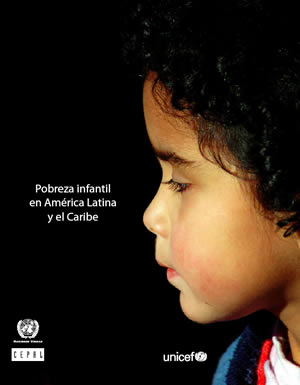Child Poverty Affects almost 81 Million Children in Latin America and the Caribbean
Work area(s)
Research included the lack of basic rights and social and economic deprivation to measure child poverty.

(17 May 2011) In Latin America and the Caribbean, 45% of children are affected by at least one moderate to severe deprivation, which means that almost 81 million people aged under 18 suffer from child poverty, according to a study by the Economic Commission for Latin America and the Caribbean (ECLAC) and the United Nations Children's Fund (UNICEF).
The study Child poverty in Latin America and the Caribbean, which develops rights-based measurement and diagnosis of child poverty in the region and seeks to put forward public policy recommendations to overcome the problem, points to a very uneven situation among countries: in Bolivia, El Salvador, Guatemala, Honduras and Peru, over two thirds of children are poor; while in Chile, Costa Rica and Uruguay, fewer than one in four children live in poverty.
The study, carried out between 2008-2009, measured multiple dimensions of child poverty in Latin America and the Caribbean, linking each one to compliance with the International Convention on the Rights of the Child, which came into force in 1989. The study took account of factors such as nutrition, access to drinking water, connection to sanitation services, quality of housing and the number of people per room, school attendance and access to information and communication media, as deprivation thereof contributes to a frame of poverty and social exclusion.
The analysis also considered the level of household income and the potential capacity of these resources to meet their basic needs.
In the preface to the document, Alicia Bárcena, Executive Secretary of ECLAC, and Bernt Aasen, UNICEF Regional Director for Latin America and the Caribbean, state that "in order to eliminate the scourge of child poverty, governments must integrate social policy, employment policy and macroeconomic policy. This requires allocating greater resources to promoting children's rights, providing a protective environment, increasing the provision and quality of services, as well as extending social protection systems".
In terms of public policy, the report states that overcoming child poverty involves investing in childhood and reducing the ongoing socioeconomic, territorial, ethnic and gender inequalities in all the region's countries. This process must be implemented from the earliest age, so as to break the intergenerational reproduction of poverty.
Lastly, the study describes the multisectoral public interventions that should be introduced in order to eliminate child poverty, in particular by guaranteeing the right to food, health, water, sanitation, education and information.
The study Child Poverty in Latin America and the Caribbean is available in Spanish on the ECLAC website.
Any queries should be addressed to the ECLAC Public Information and Web Services Section. E-mail: dpisantiago@cepal.org; Tel.: (56 2) 210 2040 or the UNICEF Communications and Advocacy Unit for Latin America and the Caribbean. Contact: Tamar Hahn, E-mail: thahn@unicef.org, Tel. (+507) 3017485. www.unicef.org/lac.
Follow us on: Twitter, Facebook, Flickr and YouTube.
Country(ies)
- Latin America and the Caribbean
Contact
Public Information Unit
- prensa@cepal.org
- (56 2) 2210 2040